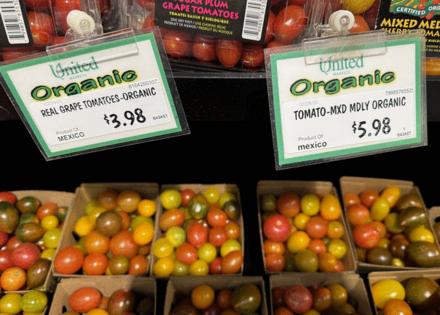Jonathan Levin: What the tomato teaches us about free trade
Published in Op Eds
Most tomatoes from Mexico will face a 21% tariff effective July 14, the U.S. Department of Commerce said recently. Ironically, the “love apple” may be the perfect illustration of how trade contributes to economic prosperity — and of the folly of President Donald Trump’s protectionist policies.
First and foremost, the tomato trade gives Americans access to wintertime produce. While fresh U.S. tomatoes are abundant and delicious in the summer, most states simply can’t produce the fussy fruit on a year-round basis (Florida is the primary exception here, and I’ll return to it shortly.) Before agricultural trade boomed under the North American Free Trade Agreement, U.S. consumers had to pay significantly more for a tomato in December or January than in August or September. The growth of trade has not only slowed tomato inflation, it’s also made supply and prices more stable.
Second, trade has allowed the U.S. and its partners to focus on their comparative advantages, just as the British economist David Ricardo famously predicted. In Mexico, tomatoes and other crops thrive thanks to year-round warm and arid conditions, as well as access to low-cost labor. Meanwhile, Mexican growers have perfected the use of greenhouses — often erected with government subsidies, to the chagrin of U.S. competitors — to efficiently produce tasty tomatoes without all the pesticides. While Florida has a proud winter tomato-growing tradition, its comparatively humid weather makes it a haven for pests and fungal diseases. And the prevalence of hurricanes makes it significantly less hospitable to greenhouses.
Fortunately, U.S. consumers get the benefits of the Mexico tomato trade with only modest collateral damage. When Florida farmers retreat from the tomato business, they tend to sell out to residential real estate developers, sometimes netting a fortune. Florida cropland has seen some of the fastest growth in value and is now the nation’s third-most expensive after California and New Jersey. Just last month, the Palm Beach Post reported that one family had received approval to turn its five-decade-old tomato farm into a patch of “large estate homes.” A few years ago, another family sold its 332-acre tomato, squash and pepper farm to residential builder GL Homes for $215 million.
While Florida has lost millions of acres of farmland, the decline actually happened at a much faster clip prior to the enactment of NAFTA, now called the United States-Mexico-Canada Agreement. The most abrupt declines happened between 1970 and 1990, coincident with Florida’s emergence as a retirement mecca. Since 1990, the retreat has basically mirrored the broader national trend.
Evidently, Florida’s Ricardian comparative advantage is not fresh produce but residential real estate, hotels and theme parks. While the state has lost agricultural jobs, they tend to be the sorts of positions that Floridians shy away from anyway (farms are staffed by temporary workers on H-2A agricultural visas). At the same time, the economy has gained opportunities for construction workers, not to mention the myriad service-industry professions catering to the booming population.
If there’s an obvious downside, it’s environmental. A report from the University of Florida last year showed that the loss of rural land and the unfettered march of residential development makes the area much more susceptible to the effects of climate change. But that’s an issue better managed through specific land-preservation initiatives rather than tomato tariffs. And while farms may be better than McMansions, Florida’s industrial agriculture business — with its reliance on powerful pesticides — has hardly been kind to the environment.
All this said, the tomato trade has survived many prior protectionist pushes, including the Supreme Court’s Nix v. Hedden decision of 1893, which unanimously held that tomatoes were vegetables (despite what the dictionary says) and were therefore not eligible for the fruit exemption under the Tariff of 1883. Since 1996, the Mexico-U.S. tomato trade has operated under several so-called suspension agreements, under which the U.S. agrees to put off anti-dumping cases partially in exchange for commitments by Mexican producers to sell above an often-renegotiated reference price. Like clockwork, every half-decade or so the U.S. has gone to the brink of restarting anti-dumping investigations, only to reach an 11th-hour deal that broadly maintains the status quo.
Americans who love fresh tomatoes with their pasta can still hold out hope that this spat will get resolved in a similar fashion. And all Americans, even those misguided few who don’t like tomatoes, should hope that the Trump administration soon comes to its senses and realizes that trade leaves both parties better off.
____
This column reflects the personal views of the author and does not necessarily reflect the opinion of the editorial board or Bloomberg LP and its owners.
Jonathan Levin is a columnist focused on U.S. markets and economics. Previously, he worked as a Bloomberg journalist in the U.S., Brazil and Mexico. He is a CFA charterholder.
©2025 Bloomberg L.P. Visit bloomberg.com/opinion. Distributed by Tribune Content Agency, LLC.




























































Comments